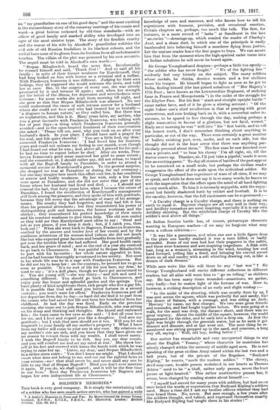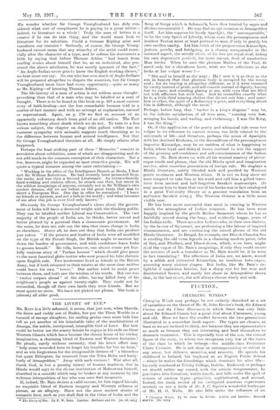A SOLDIER'S MEMORIES.*
THIS book is very good company. It is simply the entertaining talk of _a soldier who has seen much active service, who has gained a wide • A Soldier's Memories in Peace (ad War. By Mnior-General Sir George Young. husband, K.C.31.G., F.B.G.S.„ &c. Illustrated. London Herbert Jenkins. (12s. Gd. net.]
knowledge of men and manners, and who knows how to tell his experiences with humour, precision, and occasional emotion. Certain chapters are, perhaps, too much like talk. The first, for instance, is a mere record of " larks " at Sandhurst in the late " seventies "—dressings-up, which remind the reader of Charley's Aunt, and a sham duel, in which one of the principals is easily bamboozled into believing himself a murderer flying from justice. Let the mature reader leave the first pages to boys. We can assure him that from the moment when the high-spirited cadet turns into an Indian subaltern he will never be bored again.
Sir George Younghusband despises—perhaps a little too openly- " the soldier who has never fought." " We of the fighting line " evidently feel very bitterly on the subject. The many soldiers whose medals, he thinks, deceive women and a few civilians rouse his temper. He himself began to fight as soon as he got to India, finding himself (the last-joined subaltern of " Her Majesty's 17th Foot ; later known as the Leicestershire Regiment, of undying fame in France and Mesopotamia ") in the midst of the struggle for the Khyber Pass. But his first " stark and straight upright battle " came rather later, and of it he gives a stirring account : " Of the night before one's chief recollection is that of praying with great earnestness, and now looking back on it, with a somewhat naive in- sistence, to be spared to live through the day, making perhaps a slight reservation in favour of a glorious, but not fatal, wound." Early next morning he was " well into " his " first battle, and to toll the honest truth, I don't remember thinking about anything in particular, or out of the way. Thore were certainly a great number of bullets swishing past, over, under, and on each side, but the thought did not in the least occur that there was anything par- ticularly personal about them." The first man he saw knocked over was a private, and " to hear his cheery I'm all right, sir, till the doctor comes up. Thankee, sir, I'll just take a pipeful,' made it seem like an exciting game." To-day all stories of battles of the past appear to be conceived on a small scale, but perhaps the civilian reader exaggerates the effect of the scale upon the individual soldier. Sir George Younghusband has experience of wars of all sizes, if we may so speak, and while he does not say it in so many words, he leaves us with the impression that the effect upon the mind of all hard fighting is vory much alike. To him it is intensely enjoyable, with the enjoy- ment but faintly shadowed forth by cricket and football. It is in the cavalry, however, that the full excitement can be experienced :- " A Cavalry charge is a Cavalry charge, and there is nothing on earth to equal it. Bayonet charges are all very well in their way, and Artillery tornadoes are most inspiring, especially if it is our own Artillery shooting. But the whirlwind charge of Cavalry lifts the soldier's soul above all things."
An Indian frontier battle has, of course, picturesque elements wanting in European warfare—if we may be "forgiven what may seem a callous criticism :-
" It was like a panorama, and when one saw a little figure drop in the plain one hardly realised it was a man killed, or badly wounded. Some of our men had lost their pugarees in the melee, and these were fearsome and awe-inspiring tragedians. A Sikh with hair, long as a woman's, streaming in the wind, bending low and hard forward, yelling like a fiend, and bringing his curved sword down on all and sundry with a soft whistling drawing cut, is like a demon of dark dreams."
While men write like this will there be any " last war " ? Sir George Younghusband will excite different reflections in different readers, but all alike will want him to " go on telling," as children say. He has been many times wounded—sometimes, we gather, very badly—but he makes light of the fortune of war. Here is, however, a striking description of an early and slight mishap :- " In the midst of the shooting, which was mostly done by us, I was sent across the square, which was perfectly flat and sandy, like the desert of Sahara, with a message, and was riding an Arab, Mercury ' by name, my first charger. We two were groat friends and comrades, and had fought together before. We were going at a walk, for the sand was deep, the distance short, and there was no great urgency. About the middle of the square, however, the world disappeared for the rider, and he sank into a deep sea. At first the light was bright through the greenish water, but as he sank it got dimmer and dimmer, and at last went out. The next thing he re- membered was sitting propped up in the sand, and someone, a long way off, saying Well, old boy, feeling better ? ' " Our author has remarkable and very unexpected things to say about the English " Tommy," whose character he maintains has utterly changed within tho memory of middle-aged men. He is not speaking of the great civilian Army raised within the last two and a half years, but of the private of the Regulars. "Rudyard Kipling," he asserts, "made the modern soldier." " The cheery, devil-may-care, lovable person enshrined in our hearts as Thomas Atkins " used to be " a bluff, rather surly person, never the least jocose or light-hearted." This rather unattractive person has, it seems, been changed by reading stories about himself :-
" I myself had served for many years with soldiers, but had never once heard the words or expressions that Rudyard Kipling's soldiers used. Many a time did I ask my brother officers whether they had ever heard them. No, never. But sure enough, a few years after the soldiers thought, and talked, and expressed themselves exactly like Rudyard Kipling had taught them in his stories t "
We wonder whether Sir George Younghusband has duly con- sidered what sort of compliment he is paying to a great writer— indeed, to literature as a whole ! Truly the man of letters is a creator if he can do this thing, and the world must look to literature for its salvation. Could a German Kipling arise and transform our enemies ? Seriously, of course, Sir George Young- husband cannot mean that any wizardry of the artist could essen- tially alter the character of a type, and he softens his statements a little by saying that before Thomas Atkins " had learnt from reading stories about himself that he, as an individual, also pos- sessed the above attributes, he was mostly ignorant of the fact." " An Anglo-Indian never gots to know the English working classes," we hear some one say. No one who has seen much of Anglo-Indians will bo prepared altogether to dispute the assertion, but Sir George Younghusband must have had every opportunity—quite as many as Mr. Kipling—of knowing Thomas Atkins.
The life-history of a man of action is not seldom more thought- provoking than that of a man who may be labelled as a man of thought. There is to be found in this book on p. 107 a most curious story of faith-healing—not the less remarkable because told in a matter-of-fact manner and with no attempt at explanation, natural or supernatural. Again, on p. 270 we find an account of an
apparently voluntary death from grief of an old native. The East knows something about death which we do not. To turn to a less serious subject, the chapter on dogs (this gallant soldier has an immense sympathy with animals) suggests much theorizing as to the difference between human and animal intelligence. Not that Sir George Younghusband theorizes at all. Ho simply relates what
happened.
Perhaps the least striking part of these " Memories " consists in anecdotes about celebrities, some of which are disappointing and do not add much to the common conception of their characters. Not a few, however, might bo regarded as most attractive gossip. We will quote a typical instance among the more entertaining
" Working in the office of the Intelligence Branch at Simla, I first mot Sir William Robertson. Ho had recently-been promoted from the ranks, and was then a Second Lieutenant. An extraordinarily hard-working and zealous officer, ho struck ono then, but never in the wildest imaginings of anyone, certainly not in Sir William's own modest dreams, did we see before us the great brain that was to direct a European War. One day in office he remarked ' I have no friends or interest, and not a bob in the world ; and what becomes of me after this job is over God only knows.' "
Obviously Sir George Younghusband's views about the govern- ment of India will have a deserved weight with the thinking public. They can be labelled neither Liberal nor Conservative. Tho vast majority of the people of India are, ho thinks, better served and better pleased by a paternal than a democratic government. All the same, he does not rule out the idea that times change in India as elsewhere. Above all, he does not deny that India can produce just rulers. " If the princes and leaders of India were all modelled on the type of Sir Pertab Singh, the British might to-morrow lay down the burden of government, and with confidence leave India to govern herself." Ho tells, however, one almost comic yet fear- fully ominous story of " Pathan honour " which should give pause to the most fanatical globe-trotter who ever poured his false rhetoric upon English rule. Two landowners lived as friends in the British Army, but if both returned to their estates at the same time neither could leave his own " tower." Our author tried to make peace between them, and both saw the wisdom of his words. But one was " twelve corpses ahead "- of the other, having killed forty of his neighbour's people as against twenty-eight. They could not bo reconciled, though off their own lands they wore friends. But we must quote no more. We have not picked out plums. The book is (almost) all alike good.



























 Previous page
Previous page